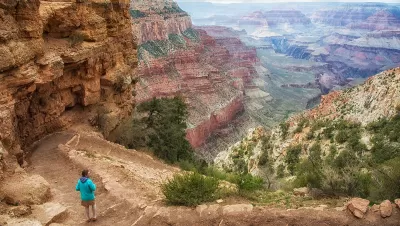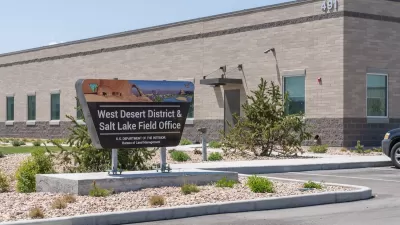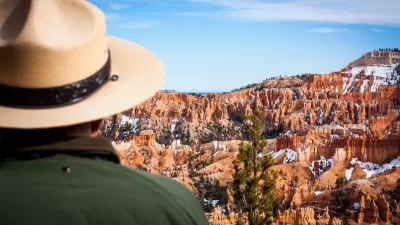By signing this new law into effect, President Trump seems ot have departed from his administration's previous actions on public lands.

"After spending his presidency denying climate change, placing coal and oil industry officials in top environmental jobs, and weakening dozens of public health and wildlife rules, President Donald Trump on Tuesday reversed course and signed a historic law to pump billions of dollars into long-neglected repairs and upgrades at America’s national parks," reports Paul Rogers.
"The measure, known as the 'Great American Outdoors Act,' is the most significant new federal conservation law in 40 years, since President Jimmy Carter doubled the size of the national park system by establishing 157 million acres of new parks, wildlife refuges, scenic rivers and other wilderness areas in Alaska during his final weeks in office in 1980."
The two major changes included in the Great American Outdoors Act include $9.5 billion in funding to be spent over the next five years to repair roads, restrooms, trails, and campgrounds at America’s 419 national parks, as well as guaranteeing $900 million a year to the Land and Water Conservation Fund in perpetuity.
Justin Wingerter provides additional news coverage of the law, covering the story with the additional angle of the benefits the act delivers to the state of Colorado.
"The Senate version of the bill was sponsored by Sen. Cory Gardner, R-Yuma, and co-sponsored by Sen. Michael Bennet, D-Denver. It was Gardner who convinced a reluctant Trump in March to back the bill, clearing it for passage through Congress," according to Wingerter.
Up until signing the new law, President Trump had championed several efforts to decrease the size and weaken protections of public lands.
An article by Carl Segerstrom responds with a skepticism earned by the Trump administration's track record, arguing that the Great American Outdoors Act's victory for conservation comes at the expense of the climate:
To pay the bill’s hefty price tag, Congress is tapping revenue from the fossil fuel industry. Though the new law has been cheered by conservation groups, it fails to address either the modern crisis of climate change or the impacts of the West’s growing recreation and tourism economy on wildlife. In this way, the Outdoors Act exposes the gaps between conservation and climate activism, while providing a grim reminder of the complicated entanglements of energy, economics, climate — and now, a pandemic.
FULL STORY: Billions for national parks as historic bill becomes law

Maui's Vacation Rental Debate Turns Ugly
Verbal attacks, misinformation campaigns and fistfights plague a high-stakes debate to convert thousands of vacation rentals into long-term housing.

Planetizen Federal Action Tracker
A weekly monitor of how Trump’s orders and actions are impacting planners and planning in America.

In Urban Planning, AI Prompting Could be the New Design Thinking
Creativity has long been key to great urban design. What if we see AI as our new creative partner?

King County Supportive Housing Program Offers Hope for Unhoused Residents
The county is taking a ‘Housing First’ approach that prioritizes getting people into housing, then offering wraparound supportive services.

Researchers Use AI to Get Clearer Picture of US Housing
Analysts are using artificial intelligence to supercharge their research by allowing them to comb through data faster. Though these AI tools can be error prone, they save time and housing researchers are optimistic about the future.

Making Shared Micromobility More Inclusive
Cities and shared mobility system operators can do more to include people with disabilities in planning and operations, per a new report.
Urban Design for Planners 1: Software Tools
This six-course series explores essential urban design concepts using open source software and equips planners with the tools they need to participate fully in the urban design process.
Planning for Universal Design
Learn the tools for implementing Universal Design in planning regulations.
planning NEXT
Appalachian Highlands Housing Partners
Mpact (founded as Rail~Volution)
City of Camden Redevelopment Agency
City of Astoria
City of Portland
City of Laramie





























